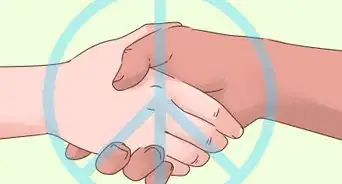This article was co-authored by Deb Schneider, LCSW, PPSC. Deb Schneider is a Licensed Clinical Social Worker in private practice in Oakland, CA, and a Program Manager for the Weiland Health Initiative at Stanford University. With over 15 years of experience, she specializes in creating safe spaces, respectful of marginalized identities, at the high school and college levels. Deb holds a Bachelor’s degree in Sociology and Women's Studies from Clark University and a Master of Social Work (MSW) with Health Concentration from the University of California, Berkeley School of Social Welfare.
This article has been viewed 34,326 times.
Asexuality is a sexual orientation associated with a general lack of sexual attraction to other people, occasionally with a total aversion to sex. It's the opposite of allosexuality, which is the term used to denote someone who does experience sexual attraction.
Steps
-
1Introduce the topic to them. It could be something such as: "Do you know what asexuality is?" Some people already understand asexuality, so you may save yourself some explaining and awkwardness if you ask what they know first.
-
2Explain what asexuality is in your own words. Start with a short overview, and see if they need more information or not. Acknowledge that asexuality involves a lack of sexual attraction, and the diversity of the asexuality umbrella.[1]
- For example, "Asexuality is a partial or total lack of sexual attraction. Some asexual people are okay with sex, while others don't like it at all."
Advertisement -
3Use an analogy, if it helps. Some people find it difficult to imagine life without sexual attraction, so it may take a little elaboration to help it sink in.
- "Imagine that an attractive person's bedroom is like a magnet. Sexual people are like metal, so their innate nature is usually to go to it. Asexual people are like plastic. There's no force driving us that direction, but we can go there if we want to."
- "To me, sex is sort of like anchovies. You can eat all the anchovies you want. I don't think any less of you if you eat anchovies. But there is no way in heck I'm touching that."
-
4Explain the asexuality umbrella. Asexual people are very diverse, and one asexual person may feel very differently from another asexual person in regards to sex.
- Demisexual: A person who only experiences sexual attraction towards people they have a strong romantic bond with and this is also very normal.
- Gray-asexual: Someone who has some sexual attraction, but not very much or not very often[2]
-
5Offer to answer questions. Asexuality can be confusing at first to people who do not understand it, and it can help if you field any questions they have.
- If a question is uncomfortable to you, say "It's personal" or "I don't feel comfortable answering that." You are never obligated to provide answers!
- If you aren't sure about the answer to a question, it's okay to say "I don't know" or "I'm not sure." If the question is really important to the person, they can always look it up and read from the experts.
-
6Expect to clear up some basic misconceptions. Most people think of sexual attraction, sex drive, and romance as part of the same package, so they may be a little confused at first as you try to explain the differences between these. You may need to explain that...
- Asexuality is healthy. It is not caused by illness or trauma. While some issues can affect someone's sex drive or willingness to have sex, those are distinct from asexuality. Someone can be happy, healthy, and asexual all at the same time.
- Asexual people are not necessarily aromantic. Aromantic people do not experience romantic attraction, and may be happily single for life. Some asexual people are interested in dating, falling in love, and marriage.
- Not all asexual people are sex-repulsed. Some enjoy and seek out sex, some are okay with it, some find it unsatisfying, and others are grossed out by it.
- Asexuality is not necessarily lack of a sex drive. It is possible to have a sex drive, without feeling sexual attraction. These people may identify as gray-asexual.
- Asexuality is a real orientation. Asexuality is as natural and innate as being straight, gay, bisexual, et cetera. Finding "the right person" won't turn them straight, or anything else. Most people who identify as asexual continue to do so for the rest of their lives.
- Asexual people are LGBTQ. Asexuality is different from heterosexuality. Asexual people do face stereotyping, oppression, and the risk of discrimination. They may struggle with self-esteem and mental health issues, and may face rejection by family, depending on how bad their situation is.
-
7Just do your best. Don't worry if you can't or don't want to give a comprehensive explanation. Educating others is nice, but optional, and you are never obligated to hand-hold someone through their discovery of the letters in LGBTQIA. Feel free to end a conversation at any time you want to, and refer them to AVEN if they want to learn more.
Community Q&A
-
QuestionI'm 13 and I came out as asexual to my mom. She told me that I can't really know that until I'm older. How do I tell her that it is possible to know at my age?
 Community AnswerInstead of trying to convince her, realize that it doesn't matter what she, or anyone else believes. You know you're asexual and that's all that matters. As you get older, and she realizes this is not a phase, she will hopefully come around and be more accepting.
Community AnswerInstead of trying to convince her, realize that it doesn't matter what she, or anyone else believes. You know you're asexual and that's all that matters. As you get older, and she realizes this is not a phase, she will hopefully come around and be more accepting. -
QuestionI'm a 17 year old straight demisexual/grey asexual and want to tell my parents. However, I'm afraid they won't believe me or will disapprove. How should I tell them?
 Hazel MeehanCommunity AnswerOne way to come out is to sit down with your parents and say something "'I want to tell you something, and I want you to hear me out." Explain what you identify as, and what it means. Be prepared to answer any questions they may have. They may react negatively at first, so give them some time to understand.
Hazel MeehanCommunity AnswerOne way to come out is to sit down with your parents and say something "'I want to tell you something, and I want you to hear me out." Explain what you identify as, and what it means. Be prepared to answer any questions they may have. They may react negatively at first, so give them some time to understand. -
QuestionI'm almost 18, and I've attempted to come out to my parents multiple times via hints. My dad says I'm too young, and my mom doesn't understand. What I do?
 Community AnswerDon't drop hints. Don't beat around the bush. Just sit your parents down and talk with them. Be as honest and detailed as needed for them to understand. Nobody should be facing problems alone, and you should receive the backing from your family.
Community AnswerDon't drop hints. Don't beat around the bush. Just sit your parents down and talk with them. Be as honest and detailed as needed for them to understand. Nobody should be facing problems alone, and you should receive the backing from your family.
Warnings
- Not everybody understands that a lack of sexual attraction isn't bad. If they try to tell you that "you just haven't met the right person yet" or something even more crass, calmly disagree with them; if you have to, walk away.⧼thumbs_response⧽
- Stay away from people who are prejudiced against asexual people, or against anyone who falls under the LGBT+ umbrella. Cruelty and toxic behavior aren't something you should have to put up with, so keep a safe distance to protect yourself.⧼thumbs_response⧽
- If anyone hurts you in ANY way for being asexual, call the emergency services.⧼thumbs_response⧽
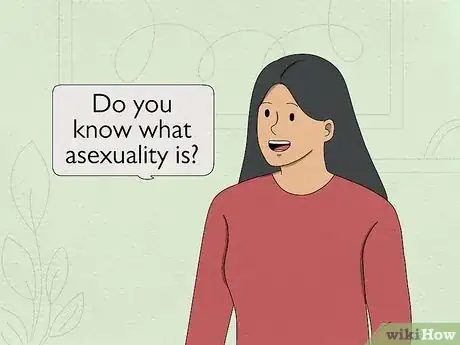
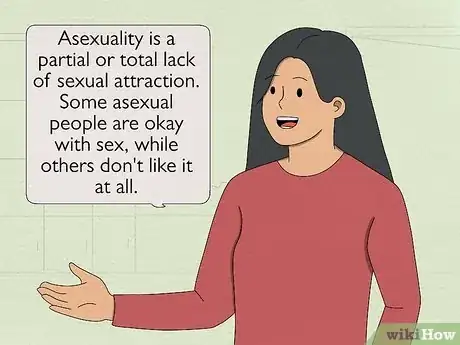
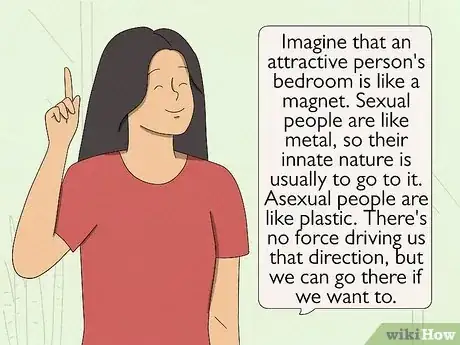
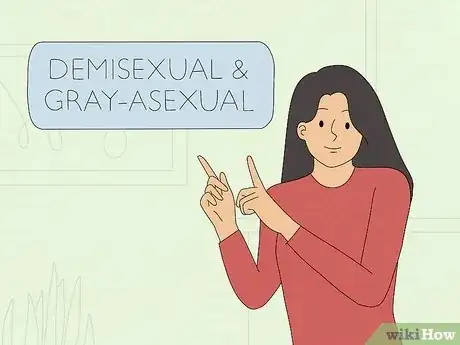
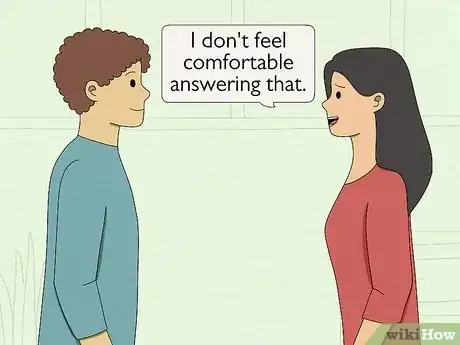
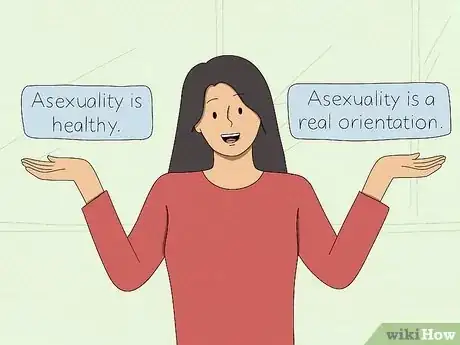
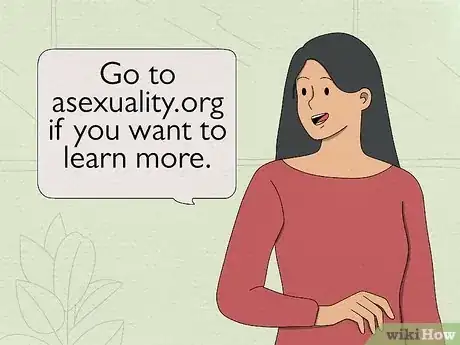



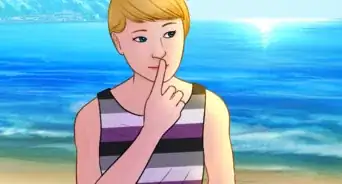
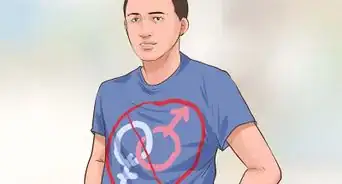
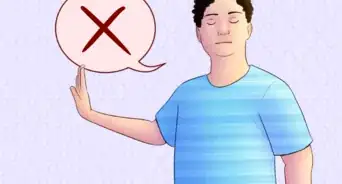
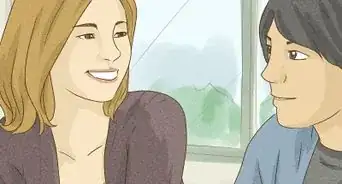
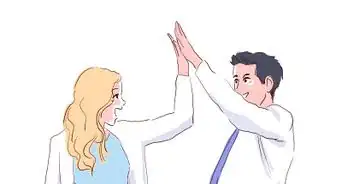
-Step-14-Version-2.webp)
-Step-16.webp)



